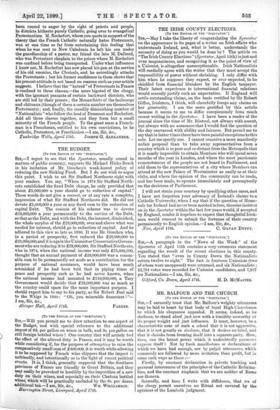THE IRISH COUNTY ELECTIONS.
(To THE EDITOH OP THE "SPECTATOR.") Srit,—May I take the liberty of congratulating the Spectator on the appearance in its pages of a writer on Irish affairs Who understands Ireland, and, what is better, understands the necessity of doing as you would be done by The article on "The Irish County Elections" (Spectator, April 15th) isjust and even magnanimous, and recognising it as the point of view of a Unionist, is altogether .unexceptionable. Irish Nationalist's will cordially agree with the writer that they must accept the responsibility of power without shrinking. I only differ with him when he supposes they . expect, or ever expected, to be shielded from financial blunders by the English taxpayer. Their latest experience in international financial relations would scarcely justify such an expectation. If England will settle outstanding claims, on the basis certified by Sir Robert Giffen, Irishmen, I think, will cheerfully forego any claims On her generosity. I am the more gratified by this article because it seems to me to differ conspicuously from much recent writing in the Spectator. I have been a reader of the journal since the time of Mr. Rintoul, not always with assent, but always with an assurance that I would find the question Of the day canvassed with ability and. fairness. But permit me to say that in latter times there have been painful exceptions to this rule. Let me specify one. I cannot conceive a more manifestly unfair proposal than to take away representatives from a country which is so poor and so distant from the Metropolis that it is nearly impossible to obtain.Members who will spend seven months of the year in London, and where the most passionate remonstrances of the people are not heard in Parliament, and add them to the representatives of a city where Members can attend at the new Palace of Westminster as easily as at their clubs, and where the opinion of the community can be made, and has been made, to operate immediately and peremptorily on the decisions of Parliament.
I will not strain your courtesy by specifying other cases, and I have not forgotten your advocacy, of Ireland's claims to-a Catholic University, when I say that if the question of Home- rule for Ireland had never been mooted before, theories insisted on in the Spectator within the last few years would, if accepted by England, render it hopeless to expect that thoughtful Irish- men would consent to submit the fortunes of their country permanently to English opinion.—I am, Sir, Arc.,






































 Previous page
Previous page